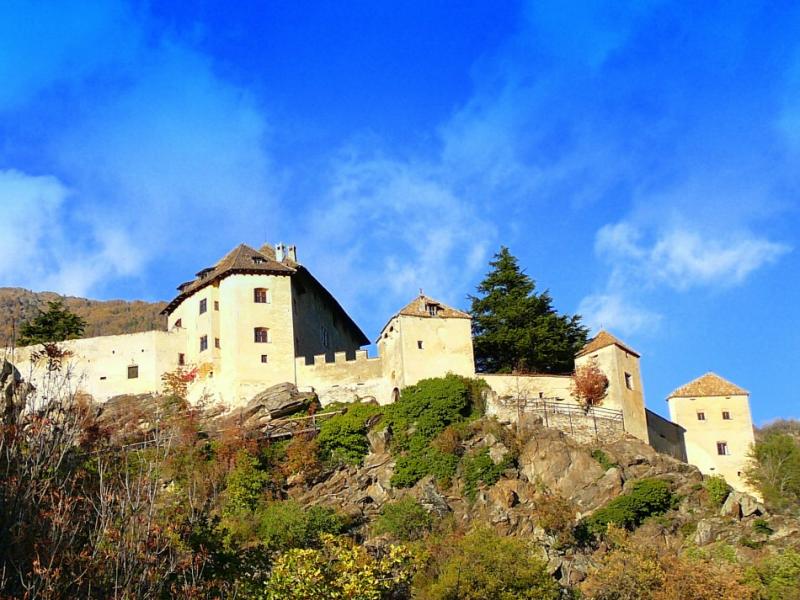Words and Pictures by Gillian Price and F. Delventhal
This is the South Tyrol in Italy’s north-east, part of the erstwhile Hapsburg Empire until the aftermath of the First World War. And this breathtaking eyrie is home to a pioneer in Himalayan mountaineering, Reinhold Messner, ‘the most famous climber in the world today’.
Holder of the record for scaling the world’s highest peaks without bottled oxygen, Messner also ascended Everest solo, amongst other mind-boggling achievements. Back in his native Alps, in 1983 he took over Schloss Juval and spent 12 years lovingly restoring the castle.
In 1995, Messner installed his remarkable collection of Asian and African artefacts and opened a section to the public as a museum. But summers are strictly private and Reinhold insists the castle be closed to outsiders.
Illustrous history
 Standing proudly at 930 metres above sea level, high over the Vinschgau or Val Venosta, a patchwork of apple orchards, the fortified residence Schloss Juval boasts a chequered past. The name Juval possibly derives from the Latin ‘jugum altum’, (high pass) in view of its position.
Standing proudly at 930 metres above sea level, high over the Vinschgau or Val Venosta, a patchwork of apple orchards, the fortified residence Schloss Juval boasts a chequered past. The name Juval possibly derives from the Latin ‘jugum altum’, (high pass) in view of its position.
The castle dates all the way back to 1278 and Hugo Von Montalban, whose intention was to control the well-frequented if insidious passage up the neighbouring Schnalstal, a forbidding ravine that branches off north here to a high pass linking it with Austria. During the Renaissance it was enlarged at the hands of the Sinkmosel family, wine merchants, who had it decorated extensively.
Their crest bearing ibex horns still dominates the entrance (now in the company of the ghastly effigy of Yali, a respected Hindu protector!) A lengthy period of abandonment followed, until the fortuitous arrival of a Dutchman, William Rowland in 1913, though he was forced to flee under the fascist regime. It is thanks to his farsightedness that the courtyards are shaded by magnificent Himalayan cedars even today. During the ensuing period we are only informed that the castle served as a youth hostel.
Lovingly restored
 The current proprietor deserves well-earned praise for bringing the ancient edifice back to life. ‘Restoration’ rather than ‘renovation’ is the appropriate term. Virtually nothing of the original structure was actually changed. Skilled local artisans were called in to repair tile and timber floors, craft beautiful doors and even old-style locks, and install wonderful majolica stuba stoves to heat the vast rooms - no central heating for fear of damaging the frescoes and plaster.
The current proprietor deserves well-earned praise for bringing the ancient edifice back to life. ‘Restoration’ rather than ‘renovation’ is the appropriate term. Virtually nothing of the original structure was actually changed. Skilled local artisans were called in to repair tile and timber floors, craft beautiful doors and even old-style locks, and install wonderful majolica stuba stoves to heat the vast rooms - no central heating for fear of damaging the frescoes and plaster.
The family’s ample living quarters have been fitted out with simple benches and traditional wooden furniture, in keeping with the castle feel. One dreamy timber-panelled alcove looks out to emerald fields and snow-covered ranges. From the picture-book kitchen a narrow staircase drops to the cellar directly underneath.
Here bottles of Blauburgunder (Pinot nero) from the estate’s organic vineyards are lined up, as are rounds of traditional rye bread in a curious rack. Bread was traditionally baked only twice a year in these alpine valleys, then left to dry out; a chopper was then needed to cut it into useable chunks, suitable for soups or very tough teeth!
Mecca for mountain buffs
 The adjacent room, by far the most exciting in the whole castle for mountain enthusiasts, has a sloping rough rock floor where a canvas sledge rests and shelves are heaped with bulging stuff bags and battered camping saucepans, while tattered Eskimo fur boots hang from nails. All this is gear from Messner’s epic expeditions to the far-flung corners of the earth - Greenland, the North Pole, India, Tibet...
The adjacent room, by far the most exciting in the whole castle for mountain enthusiasts, has a sloping rough rock floor where a canvas sledge rests and shelves are heaped with bulging stuff bags and battered camping saucepans, while tattered Eskimo fur boots hang from nails. All this is gear from Messner’s epic expeditions to the far-flung corners of the earth - Greenland, the North Pole, India, Tibet...
Winding stone stairs lead to an atmospheric banqueting hall on the second floor, a truly beautiful room with an arched trifora window and elegant fireplace. Beneath a vaulted ceiling inter- woven vine-leaf and rural-inspired frescoes from the mid-15th century adorn the walls, supplemented by trompe l’oeil effects to emulate columns.
Underfoot are richly woven carpets from Baluchistan. A long narrow table hewn from a single tree trunk is the legacy of an Italian monastery. This is the ‘room of the thousand delights’, named in honour of the favourite wife of the legendary figure of Gesar Ling from Tibet, an exquisite bronze statue in the corner showcase.
Further information
Schloss Juval (tel. +30 0473 668238) is open to the public from end March to end June, then September through to early November, daily 10am – 4pm except Wednesdays. Guided visits in German and Italian. Close-by is atmospheric alpine-style eatery Schlosswirt Juval, which also rents out apartments (phone number as above).
